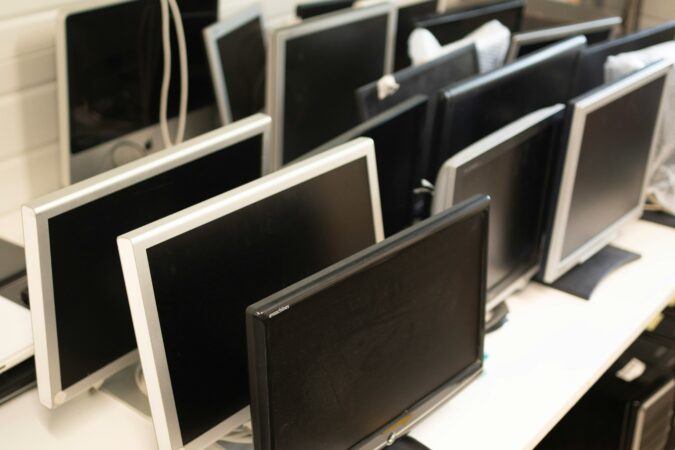
Computer Waste Facts
Computers play an important role in our daily professional and personal lives. Offices across the country are filled with high-powered computer towers while our homes have the latest laptops for work and personal use. There’s been a shift towards laptops and tablets but the PC market in the UK is still valued at around £4.5 billion.
Millions of computers, laptops, and tablets are bought each year, which means a similar amount reaches the end of their life. Sadly, over the past five years, more than 12 million computers have gone to landfill. Computers contain valuable materials and hazardous materials, so this should never be the solution.
Download some more knowledge about how many computers we throw away and the precious materials and energy expended with these computer waste facts and statistics.
What causes computer waste?
There are two main reasons why computers become waste. The first is when a computer breaks or is damaged beyond repair. This could be physical damage, such as the screen being smashed, or harm to the software or a virus that means the computer no longer works. If it can’t be fixed then most people throw it away.
The other main cause of computer waste is upgrading to a new or different machine. Offices will regularly improve their machines to increase productivity with computers that are faster, more energy efficient, and less likely to break down. When this happens there’s no need for the old machines, so they become waste.
Upgrading computers at home also creates waste due to your old device. It could be when buying a better gaming PC or downsizing from a computer to a laptop or tablet instead. Another reason for computer waste is due to moving home or office and not having the space or capacity to take it with you.
Facts about computer waste
Old computers contain lots of valuable materials that can be recovered, recycled, and reused. Therefore, computer waste should never go to landfill or be disposed of with your general waste. This includes anything from a computer tower and laptop to a mouse and keyboard. Recycling with other WEEE is vital.
Understand why recycling and responsible disposal is important with these computer waste facts:
- About a quarter of a computer is plastic but they contain hazardous materials such as:
- Arsenic
- Cadmium
- Chromium
- Cobalt
- Lead
- Mercury
- Selenium
- Computer components also contain many valuable materials that should be recovered, as there’s only a finite amount of some or they’re a recyclable material. Examples include:
- Gold (found in printed circuit boards, computer chips (CPU), and connectors)
- Silver (found in printed circuit boards, CPU, keyboard membranes, and some capacitors)
- Platinum (found in hard drives and circuit board components)
- Palladium (found in hard drives and capacitors)
- Aluminium (found in printed circuit boards, computer chips, hard drives, CPU, and heat sinks)
- Laptops are the most popular type of computer in UK households now. Many people use smartphones for activities when they previously used a computer. The split of UK homes that have computing equipment is:
- Laptop – 57%
- Tablet – 52%
- Computer – 24%
- Laptop only – 19%
- Tablet only – 15%
- Computer only – 5%
Computer waste statistics
In the UK, around 12 million computers and laptops have ended up in landfill over the past five years, which works out at more than two million every year. Many more are recycled, donated, and deconstructed for parts to be reused and resold. Global figures for computer waste are quite hard to come by as most get absorbed with e-waste stats.
Try and compute the staggering value of the old machines with these computer waste statistics:
- The laptop market size in the UK is estimated to be worth around £3.35 billion
- Recycling one million laptops could save the equivalent energy to power 3,500 homes for a year
- In the UK around 25% of people throw away old computers at the tip rather than recycling them
- £1.5 billion worth of unused laptops are hoarded in UK homes
- This includes 7 million laptops, 9.17 million tablets, and 6.5 million computers in UK households that aren’t used but could be sold or recycled
- Businesses and individuals in the USA throw away around 41 million computers every year
- Every year 300 million computers are produced globally

How should I get rid
of old computers?
To get rid of an old computer from home you can use the Retailer Take-back Scheme (RTS). Find your nearest shop offering the service and you can give them your old machine and they’ll recycle it for free. This doesn’t have to be the shop where you bought it. More than 10,000 stores in the UK offer the service.
Alternatively, you can try and sell it online or donate it to a charity shop if it still works. Some people may even buy or accept a broken old computer and strip it for parts.
Businesses must arrange commercial waste collection of any old computers by licensed waste carriers. It’s a type of WEEE so they must be stored separately from other rubbish. At Business Waste we can arrange the collection and recycling of any type and amount of computer waste from your company anywhere in the UK.
All computers are recycled, recovered, and responsibly disposed of and you receive a free duty of care certificate for added peace of mind. Get a free quote for computer waste collection from your business today – call 0800 211 8390 or contact us online.
Get a fast and free quote
Get a fast FREE quote for your computer waste collection
- Free quote within 1 hr
- Any type of computers
- FREE bins and delivery
- We cover all of the UK